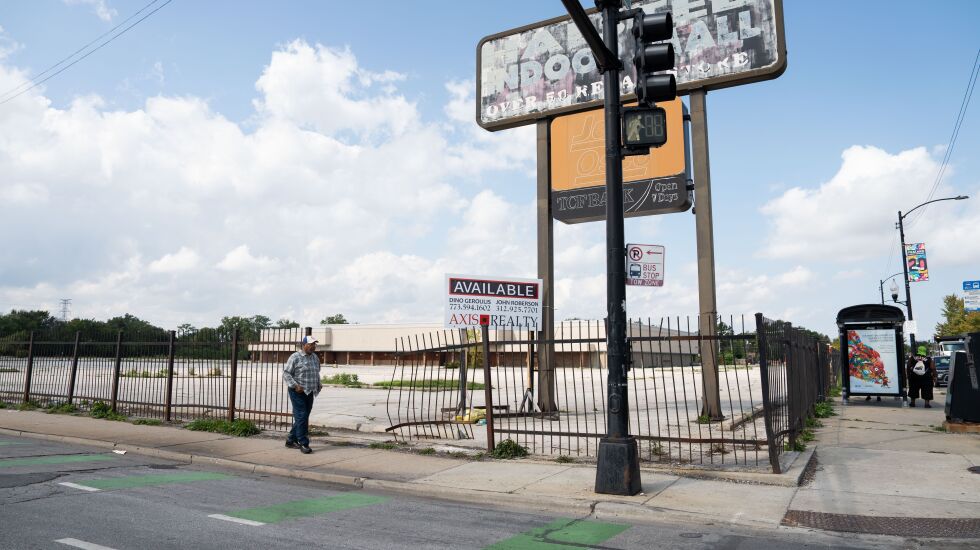
Lester Pigue, a lifelong South Sider, has had his troubles finding housing, but that doesn’t mean he begrudges help going to new migrant arrivals, even those potentially setting up camp in his own community.
“It’s just human rights,” said Pigue, 67, looking at a vacant parking lot at 115th and Halsted streets that’s been floated as the place where Mayor Brandon Johnson’s first migrant tent shelter might go. “Just because they’re from another country doesn’t mean they’re any different. They have dignity.”
The 12-acre parcel at the busy intersection in the Morgan Park neighborhood — near West Pullman and Roseland — has sat empty since a Jewel-Osco closed there around 2007. Last week, Ald. Andre Vasquez (40th), chair of the Council’s Committee of Immigrant and Refugee Rights, mentioned it as a potential site for Johnson’s “winterized base camps” for migrants.
Johnson announced his plan last week when around 2,000 migrants were sleeping on police station and airport floors, causing problems for arrivals and police. The tents would be a stopgap measure for those migrants.
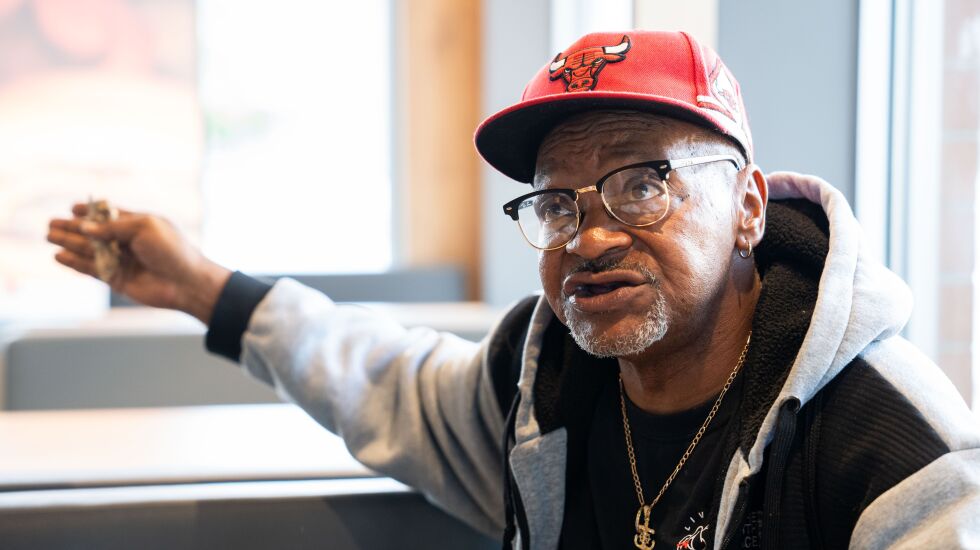
Looking at the lot from a nearby McDonald’s, Pigue said he remembered when it was a Jewel and a Venture store before that.
He lives “on a fixed income” in a “half-way house,” he said, but seeing migrants living at the Gresham District police station, several miles north on Halsted, has moved him, despite tensions over migrants getting help with housing ahead of Chicagoans.
“It’s not just a Black and Brown thing. It’s a human thing,” he said. “These people left situations of hardship to get here.”
The city did not immediately confirm that the site would become a tent shelter or when the first encampment would be built.
There is a plan to bring housing, jobs and stores to the site in a development known as Morgan Park Commons. Abraham Lacy, president and CEO of the Far South Community Development Corp. — the nonprofit behind the project — said he expected to begin construction in 2024, as originally planned.
He declined to comment on the tent plan but added that a key goal of the Morgan Park Commons project was to bring residents back to the neighborhood, and he hoped the city could find a way to look at the new arrivals as an opportunity.
“I see a benefit to any migration to our neighborhoods,” Lacy said, referring to how Chicago was built up by migrants during the Great Migration. “To any city economy, it’s a great thing to have immigration come through.”

Not everyone was so sanguine.
“Why can’t they take them to a more affluent area?” asked longtime resident Lisa Cordova. “I’m someone who loves people, but it doesn’t make sense.”
Local Ald. Ronnie Mosley (21st) led a ward meeting about the proposal Wednesday evening at Sheldon Heights Church of Christ, 11325 S. Halsted St., a longtime ward meeting place which also sits kitty-corner from the potential tent site.
The intimate church was quickly filled to capacity as residents filed into the pews. Dozens were left standing outside, shaking their heads in frustration at not being able to enter.
Many residents at the often-tense meeting said they were sympathetic to the migrants’ plight, but were opposed to the idea of a tent city in the area.
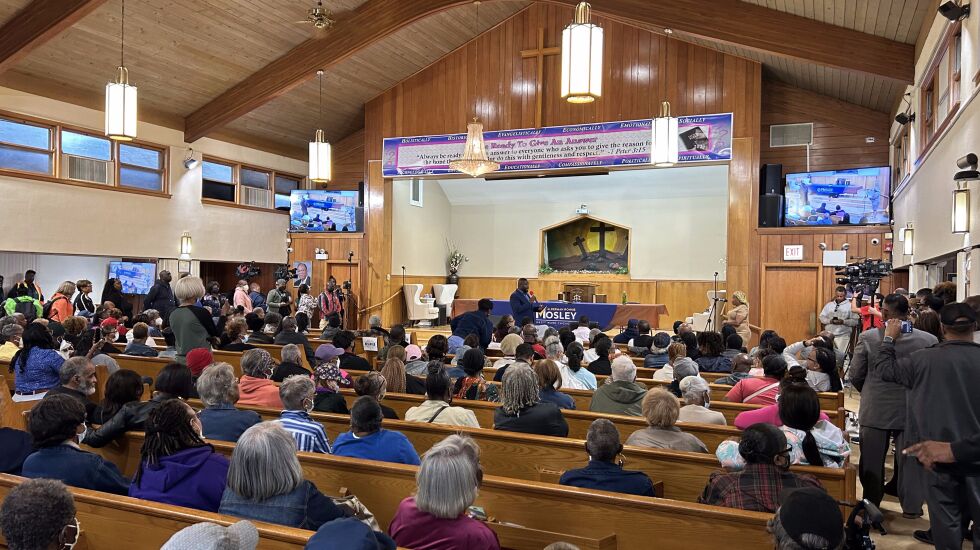
They raised concerns over whether the asylum-seekers were vaccinated, if they had background checks, where they would learn English, how the tent city would be kept clean and if it would affect property values.
Mosley assured residents that the idea of turning the site into a shelter was far from final, and the meeting was called to get community input based on preliminary talks with the mayor’s office.
“This has been a collaboration from the mayor, his office could have just said this is happening, but he reached out to us first, and I asked to bring more folks to the table, that was welcome,” Mosley said. “We are having this conversation almost in theory, because someone from that meeting decided that someone else needed to know.”
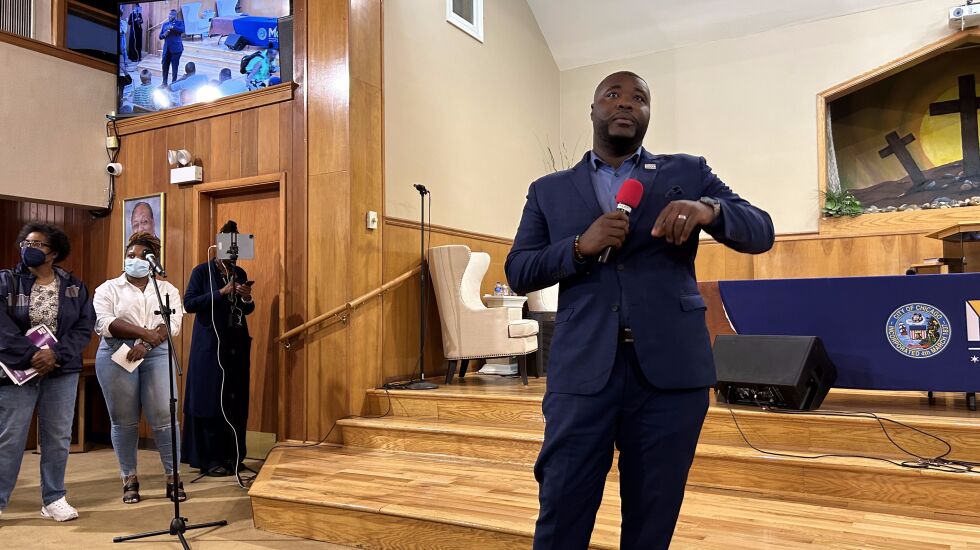
Mosley said he made it clear in meetings with the mayor’s office that the site of the proposed tent city “doesn’t work.”
As the idea is still in the early stages of planning, officials from agencies such as the Chicago Police Department and the Illinois Department of Children and Family Support Services were not present at the meeting to field questions from residents.
Attendees at the meeting were also frustrated with the amount of funds being spent to house and feed the migrants, saying that there are homeless and food insecure individuals across the city, particularly in Black neighborhoods that have historically suffered from disinvestment.
Some called for the tent city to also include Chicago’s homeless population. Others called for the funds to be put toward reparations.
Frank Thomas, a longtime resident of the neighborhood, said that it used to be a working-class enclave, and lamented how little investment it has seen. He said the city should focus its dollars on bringing the area back to a semblance of its heyday.
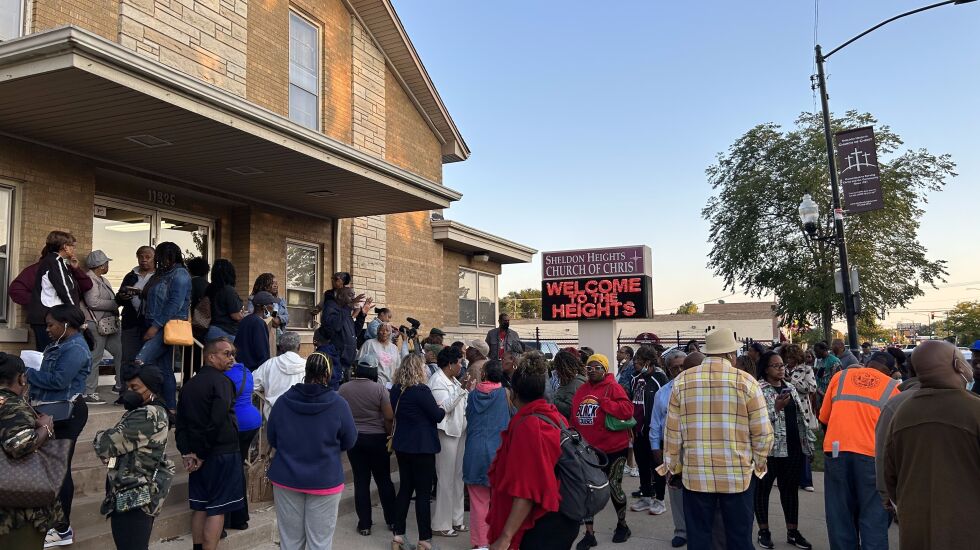
“As someone who remains in the 21st Ward, the rusty remnant of better times, you can tell them downtown: ‘NIMBY, not in my back yard. We don’t want it,’” Thomas said, eliciting applause from the crowd. “How are they going to secure it? What is the exit plan?”
The church hosts a well-known food pantry at the site, where director Eric Carter said they were already talking with the Greater Chicago Food Depository to ensure there would be enough food in case more people began arriving.
“That’s always a concern,” he said, “the possibility of running out of food.”
The food pantry sees about 250 people per week. When Spanish-speakers have shown up in the past, he said the volunteer staff has managed with Google Translate. He said those interested in volunteering could reach out on Facebook.
Speaking ahead of the meeting, the Rev. Leonardo Gilbert said that the church “was in support of helping people.”
The longtime pastor of the church didn’t know if the tents would in fact go up but said they would help provide blankets, coats or whatever else was needed if it gets built there.
“What’s a burden for them,” he said referring to what the migrants have been faced with so far, “is an opportunity for us to create a blessing.”
Michael Loria is a staff reporter at the Chicago Sun-Times via Report for America, a not-for-profit journalism program that aims to bolster the paper’s coverage of communities on the South and West sides.







